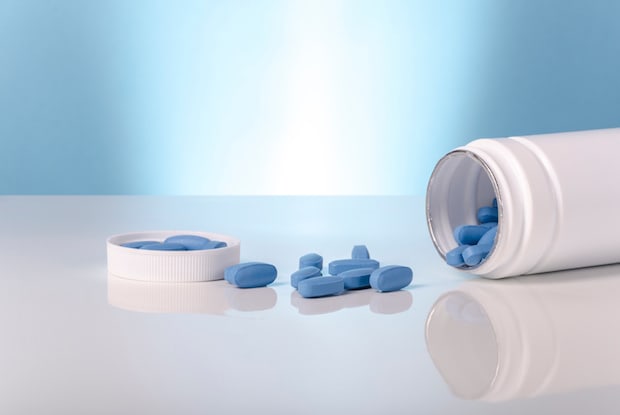Table of Contents
I. What is erectile dysfunction
What is erectile dysfunction?
Erectile dysfunction (ED) is a condition that affects millions of men in the United States. ED is a growing concern, with over 18 million men over 20 years old experiencing this condition in some form. ED is the most common sexual problem in men and is often treated with medications like Viagra (Sildenafil). Occasional ED is relatively typical, but a lot of men experience it frequently, especially during times of stress.
The inability to get or keep an erection characterizes erectile dysfunction. During sexual arousal, the muscles in the penis relax, which allows increased blood flow through the penile arteries. This blood fills two chambers within the penis, making the penis erect. When this bodily function is hindered, having sex becomes difficult, if not impossible. The two types of erectile dysfunction are detailed below. [1]
Organic erectile dysfunction
This type of ED involves any abnormality in the penile arteries or veins. Organic ED is the most common form, especially in older men. This variety of ED can be caused by several factors, including age and genetics. Abnormalities in the arteries and veins are called a venous leak, but it is a result of malfunctioning smooth muscle that surrounds the veins in the penis.
Premature ejaculation Premature ejaculation is less frequent but still a prevalent condition. PE occurs when a man is unable to delay ejaculation during sex. This type of ED is divided into lifelong and acquired categories. This describes patients who have always experienced premature ejaculation during sex versus those who have developed the condition recently. Some men may find it embarrassing to discuss erectile dysfunction with their doctor, but there is no need to be shy. Millions of men are experiencing the same thing, and with proper diagnosis, positive improvements can occur. The psychological causes of ED can often improve through therapy. Malfunctioning arteries in the penis can be a sign of arteriosclerosis or hardening of the arteries. The causes of arteriosclerosis can range from weight problems, advanced age, lack of exercise, high cholesterol, high blood sugar, and cigarette smoking. If the arteries and veins in your penis become affected by these factors, likely, problems with the arteries in your heart may soon follow. Atrophy (wasting away) or fibrosis (hardening) of tissue in the penis may explain some physical causes of ED. If the tissue atrophies or grows fibrosis, it disrupts the smooth muscle tissue in the body of the penis, which makes it challenging to get or maintain an erection. Pre-existing problems with your prostate may also put you at risk for ED. [2] Psychological factors cause around 10-20% of ED cases. Some of these factors can be a secondary reaction to a physical cause of ED, but psychological trauma or abuse may also cause this condition. Job-related stress or money problems can play on the mind, which can follow a man to the bedroom. Stress, anxiety, low self-esteem, and depression are common psychological causes of ED. [3] Occasional ED is common, but if you have trouble getting an erection several times, you may want to consult a doctor. ED symptoms can also include difficulty maintaining an erection as well as reduced interest in sex. As discussed above, premature ejaculation is a common symptom, as well as delayed ejaculation. Anorgasmia can also occur, which is characterized by the inability to reach an orgasm despite sexual stimulation. Treatment for ED can vary depending on the physical or psychological nature of your specific condition. In some cases, diet and exercise can significantly improve ED symptoms. Seeking therapy for psychological causes can help a patient cope with whatever trauma or issue that is plaguing their sex life. In more severe cases, surgeries and prescription drugs may also help. Implementing the following tips can significantly improve the state of your erectile dysfunction. If you still need some assistance, you can count on for brand name and generic ED drugs, like Cialis (tadalafil). True Canada Pharmacy is a CIPA certified pharmacy and can save hundreds on your prescription medications. Participating in exercise is beneficial to ED patients because it increases blood flow. A review of 10 studies shows that 160 minutes of weekly exercise for 6 months could lead to a decrease in ED symptoms. There is also research that suggests aerobic exercise may increase testosterone in a man. Testosterone does not improve erections, but ED is a symptom of low testosterone levels. Yoga is also an excellent way to relax the mind and body. Blood flow is the essential component to ED, and maintaining a healthy vascular system can prevent and treat this condition. A balanced diet is what keeps the body fit, so taking simple steps to change what you eat may affect more than just your waistline. Some healthy choices include: It is essential to pay attention to what you eat because particular eating and drinking behaviors may be the culprit behind your ED problems. Many men experience ED symptoms after consuming alcohol because alcohol dehydrates the body. When the body dehydrates, there is decreased blood flow, which leaves less blood for the penis during sexual stimulation. Surgery to treat ED can come with some complications, so it is often left as a last resort. If your ED problems remain persistent, your doctor may approve the implementation of a penile prosthesis. The patient is often put under general anesthesia, and an inflatable implant is placed in the penis or scrotum, depending on what type of implant you receive. This prosthesis allows the penis to bend downward for urination and upward during intercourse. Other devices allow fluid to enter the penis to create an erection. If your doctor finds that your ED problems stem from a vascular problem, then surgery to improve blood flow to the penis can be an option. [4] There are several medications that can help you manage your ED. Many of the most popular choices for ED stimulate blood flow to the penis. When a man gets aroused, the brain releases chemicals to relax arteries and constrict veins in the penis. Phosphodiesterases enzymes (PDE-5) cause the penis to return to normal after intercourse and release the blood back into the body. When this PDE-5 balance is off, medications like Cialis (Tadalafil), Viagra (Sildenafil), and Levitra (Vardenafil) tip the chemical balance back to normal. For this reason, these drugs are called PDE-5 inhibitors. Too much PDE-5 can cause difficulty getting an erection, and not enough PDE-5 can make erections last longer than 4 hours, which may require medical attention. [5] Your doctor or urologist will examine your medical and sexual history to make a proper plan for your ED. There are several steps a doctor can take to determine the severity of a man’s ED. Physical exam: A doctor will assess the appearance of the penis and check the pulse in your wrist to see if you have problems with circulation Lab tests: Blood tests uncover the possible causes of ED, which can reveal diabetes, atherosclerosis, chronic kidney disease, and hormonal problems. Imaging tests: A doctor may perform an ultrasound on your penis to detect poor blood flow through your penis. Nocturnal erection test: If your doctor still has a hard time determining the cause of your ED, they may have you wear a ring-like device around your penis while you sleep to see if you experience nocturnal erections. These tests will let your doctor know if your ED is of a physical or psychological nature. Injection test: In a health care professional’s office, you may have an intracavernosal injection administered. A health professional will inject the medicine into your penis to cause an erection. This test will help your doctor determine the cause and severity of your ED. The content in this article is intended for informational purposes only. This website does not provide medical advice. In all circumstances, you should always seek the advice of your physician and/or other qualified health professionals(s) for drug, medical condition, or treatment advice. The content provided on this website is not a substitute for professional medical advice, diagnosis or treatment.
Most common causes of ED
a. Physical
b. Psychological
Symptoms
Treatments

a. Diet and exercise
b. Surgery

c. Medications
Diagnosis
